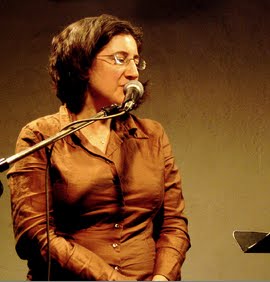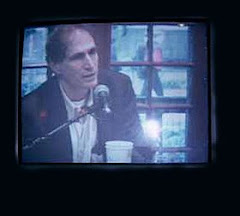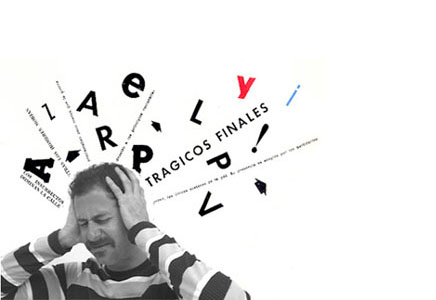 In response to PT #4, Tim Carmody writes: "Ginsberg's recordings of Blake's Songs of Innocence and Experience plays a larger role in pop music history than you might expect. Robert Christgau of the Village Voice gave the album an A- when it appeared in 1970 (close company with The Beatles' Let It Be, Joni Mitchell's Ladies of the Canyon, and James Brown's Superbad). And you can hear shades of Ginsberg's distinctive vocal warble in his friends' and admirers' recordings: Patti Smith, David Byrne of Talking Heads, Tom Verlaine of Television, and Michael Stipe of R.E.M. And Songs of Innocence and Experience got a fresh look in 2004, when Devendra Banhart, Joanna Newsom, Josephine Foster and other musicians associated with what came to be called 'freak folk' in San Francisco cited the voice and music on Ginsberg's record as an influence." [Above at left: Devendra Banhart.]
In response to PT #4, Tim Carmody writes: "Ginsberg's recordings of Blake's Songs of Innocence and Experience plays a larger role in pop music history than you might expect. Robert Christgau of the Village Voice gave the album an A- when it appeared in 1970 (close company with The Beatles' Let It Be, Joni Mitchell's Ladies of the Canyon, and James Brown's Superbad). And you can hear shades of Ginsberg's distinctive vocal warble in his friends' and admirers' recordings: Patti Smith, David Byrne of Talking Heads, Tom Verlaine of Television, and Michael Stipe of R.E.M. And Songs of Innocence and Experience got a fresh look in 2004, when Devendra Banhart, Joanna Newsom, Josephine Foster and other musicians associated with what came to be called 'freak folk' in San Francisco cited the voice and music on Ginsberg's record as an influence." [Above at left: Devendra Banhart.]
3/8/08
lineage of Ginsberg's vocal warble
 In response to PT #4, Tim Carmody writes: "Ginsberg's recordings of Blake's Songs of Innocence and Experience plays a larger role in pop music history than you might expect. Robert Christgau of the Village Voice gave the album an A- when it appeared in 1970 (close company with The Beatles' Let It Be, Joni Mitchell's Ladies of the Canyon, and James Brown's Superbad). And you can hear shades of Ginsberg's distinctive vocal warble in his friends' and admirers' recordings: Patti Smith, David Byrne of Talking Heads, Tom Verlaine of Television, and Michael Stipe of R.E.M. And Songs of Innocence and Experience got a fresh look in 2004, when Devendra Banhart, Joanna Newsom, Josephine Foster and other musicians associated with what came to be called 'freak folk' in San Francisco cited the voice and music on Ginsberg's record as an influence." [Above at left: Devendra Banhart.]
In response to PT #4, Tim Carmody writes: "Ginsberg's recordings of Blake's Songs of Innocence and Experience plays a larger role in pop music history than you might expect. Robert Christgau of the Village Voice gave the album an A- when it appeared in 1970 (close company with The Beatles' Let It Be, Joni Mitchell's Ladies of the Canyon, and James Brown's Superbad). And you can hear shades of Ginsberg's distinctive vocal warble in his friends' and admirers' recordings: Patti Smith, David Byrne of Talking Heads, Tom Verlaine of Television, and Michael Stipe of R.E.M. And Songs of Innocence and Experience got a fresh look in 2004, when Devendra Banhart, Joanna Newsom, Josephine Foster and other musicians associated with what came to be called 'freak folk' in San Francisco cited the voice and music on Ginsberg's record as an influence." [Above at left: Devendra Banhart.]
similarly addicted to Ginsberg LP
Mike Hennessey's blog, "A Crash Course in Counter-Intelligence", riffs off PoemTalk #4 helpfully:
I look forward to each new PoemTalk for the sharp insights of its panelists..., but this is the first episode that covers both a poet and a poem with which I’m intimately familiar...
For me, the most salient aspect of the program was hearing Charles Bernstein discuss the great sway that Ginsberg’s Songs of Innocence and Experience album had over him as a Harvard undergrad — in part because I had a similar experience during my college years. Somehow, I’d managed to come across a 50%-off coupon to Borders and scurried out to the local strip mall as quickly as possible to purchase a (suddenly affordable) copy of Ginsberg’s 4-disc box set, Holy Soul Jelly Roll: Poems and Songs, 1949-1993, which I then listened to intensely over the next few years. I remember being stranded in Cleveland over the summer of 1999, during which time my discman and sleeve of cds were one of the few defenses I had against monotony and a quickly-dissolving romantic relationship — and one of my favorite things to listen to was disc 3 of the Ginsberg collection, which was largely comprised of selections from the Blake album.
 Why the Blake tracks in particular? First, while I was well-acquainted with Ginsberg’s major poems (in fact, by this point, the spine was nearly broken on my big red Ginsberg collected from little slips of paper marking my favorite poems), they tend to run long, and it requires a considerable amount of attention to absorb, say, a thirty-minute recording of “Howl,” let alone the hour-plus rendition of “Kaddish,” especially when doing data entry or photocopying medical records (so much for quality control). The Blake songs, on the other hand, were like perfect little pop ditties — radio-ready, catchy and always surprising. This is largely due to the impressive roster of musicians, including well-known jazz figures Don Cherry (who plays a half-dozen instruments including harpsichord and wooden flute), Bob Dorough (best known as the musical director for Schoolhouse Rock) and Elvin Jones (John Coltrane’s scattershot drummer), who manage to create a fantastic amalgam of free-jazz, funereal drone, folk and Bach to accompany the songs. While some of Ginsberg’s later musical experiments fall flat (the calypsos, blues songs and pop-punk numbers occupying disc 4 of the box set), these songs are timeless and ever-engaging.
Why the Blake tracks in particular? First, while I was well-acquainted with Ginsberg’s major poems (in fact, by this point, the spine was nearly broken on my big red Ginsberg collected from little slips of paper marking my favorite poems), they tend to run long, and it requires a considerable amount of attention to absorb, say, a thirty-minute recording of “Howl,” let alone the hour-plus rendition of “Kaddish,” especially when doing data entry or photocopying medical records (so much for quality control). The Blake songs, on the other hand, were like perfect little pop ditties — radio-ready, catchy and always surprising. This is largely due to the impressive roster of musicians, including well-known jazz figures Don Cherry (who plays a half-dozen instruments including harpsichord and wooden flute), Bob Dorough (best known as the musical director for Schoolhouse Rock) and Elvin Jones (John Coltrane’s scattershot drummer), who manage to create a fantastic amalgam of free-jazz, funereal drone, folk and Bach to accompany the songs. While some of Ginsberg’s later musical experiments fall flat (the calypsos, blues songs and pop-punk numbers occupying disc 4 of the box set), these songs are timeless and ever-engaging.
For more of this blog entry, go here.
I look forward to each new PoemTalk for the sharp insights of its panelists..., but this is the first episode that covers both a poet and a poem with which I’m intimately familiar...
For me, the most salient aspect of the program was hearing Charles Bernstein discuss the great sway that Ginsberg’s Songs of Innocence and Experience album had over him as a Harvard undergrad — in part because I had a similar experience during my college years. Somehow, I’d managed to come across a 50%-off coupon to Borders and scurried out to the local strip mall as quickly as possible to purchase a (suddenly affordable) copy of Ginsberg’s 4-disc box set, Holy Soul Jelly Roll: Poems and Songs, 1949-1993, which I then listened to intensely over the next few years. I remember being stranded in Cleveland over the summer of 1999, during which time my discman and sleeve of cds were one of the few defenses I had against monotony and a quickly-dissolving romantic relationship — and one of my favorite things to listen to was disc 3 of the Ginsberg collection, which was largely comprised of selections from the Blake album.
 Why the Blake tracks in particular? First, while I was well-acquainted with Ginsberg’s major poems (in fact, by this point, the spine was nearly broken on my big red Ginsberg collected from little slips of paper marking my favorite poems), they tend to run long, and it requires a considerable amount of attention to absorb, say, a thirty-minute recording of “Howl,” let alone the hour-plus rendition of “Kaddish,” especially when doing data entry or photocopying medical records (so much for quality control). The Blake songs, on the other hand, were like perfect little pop ditties — radio-ready, catchy and always surprising. This is largely due to the impressive roster of musicians, including well-known jazz figures Don Cherry (who plays a half-dozen instruments including harpsichord and wooden flute), Bob Dorough (best known as the musical director for Schoolhouse Rock) and Elvin Jones (John Coltrane’s scattershot drummer), who manage to create a fantastic amalgam of free-jazz, funereal drone, folk and Bach to accompany the songs. While some of Ginsberg’s later musical experiments fall flat (the calypsos, blues songs and pop-punk numbers occupying disc 4 of the box set), these songs are timeless and ever-engaging.
Why the Blake tracks in particular? First, while I was well-acquainted with Ginsberg’s major poems (in fact, by this point, the spine was nearly broken on my big red Ginsberg collected from little slips of paper marking my favorite poems), they tend to run long, and it requires a considerable amount of attention to absorb, say, a thirty-minute recording of “Howl,” let alone the hour-plus rendition of “Kaddish,” especially when doing data entry or photocopying medical records (so much for quality control). The Blake songs, on the other hand, were like perfect little pop ditties — radio-ready, catchy and always surprising. This is largely due to the impressive roster of musicians, including well-known jazz figures Don Cherry (who plays a half-dozen instruments including harpsichord and wooden flute), Bob Dorough (best known as the musical director for Schoolhouse Rock) and Elvin Jones (John Coltrane’s scattershot drummer), who manage to create a fantastic amalgam of free-jazz, funereal drone, folk and Bach to accompany the songs. While some of Ginsberg’s later musical experiments fall flat (the calypsos, blues songs and pop-punk numbers occupying disc 4 of the box set), these songs are timeless and ever-engaging.For more of this blog entry, go here.
3/3/08
bard goes country (PoemTalk #4)
 LISTEN TO THE SHOW
LISTEN TO THE SHOWHear the voice of the bard....
Which bard? Well, we're not quite sure how bardic Charles Bernstein is but he certainly loves the idea of poem as song; he joined some by-now regular PoemTalkers (Rachel Blau DuPlessis and Jessica Lowenthal) and chanted for us that very line. We've worn the grooves on an old LP of Allen Ginsberg singing William Blake's Songs of Innocence & Experience and for the fourth PoemTalk chose Ginsberg's countrified (crossover?) rendition of "The Garden of Love." Does the snappy, twangy (and relatively tuneful) setting create an irony? Jessica thinks yes; Charles thinks no.
But perhaps the tune should be in conflict with the poem's sense, and thus perhaps Ginsberg was not so much pushing a song of experience into a popular (and thus single-direction-tending) mode so much as making it still more Blakean.
The binary of innocence and experience, Rachel says, is broken by the way the song is sung. Blake wanted the binary to be broken; Ginsberg only breaks it further. And seems to been having fun along the way.
Listen for the happy out-take at the end. We had some fun ourselves, albeit somewhat atonally and quite arhythmically.
The Garden of Love
I went to the Garden of Love,
And saw what I never had seen;
A Chapel was built in the midst,
Where I used to play on the green.
And the gates of this Chapel were shut,
And 'Thou shalt not' writ over the door;
So I turned to the Garden of Love
That so many sweet flowers bore.
And I saw it was filled with graves,
And tombstones where flowers should be;
And priests in black gowns were walking their rounds,
And binding with briars my joys and desires.
PoemTalk #4 was recorded in the Arts Cafe of the Kelly Writers House in Philadelphia. Al Filreis and Mark Lindsay produced; Steve McLaughlin is our director, engineer and editor. Ginsberg's Blake song were recorded in New York City in 1969; PennSound has a complete collection of these recordings. Be sure to check out PennSound's Ginsberg page.
Subscribe to:
Posts (Atom)

























